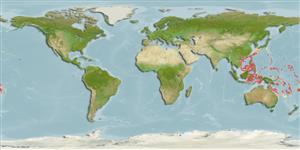>
Aulopiformes (Grinners) >
Paraulopidae (Cucumber fishes) > Chedrinae
Etymology: Paraulopus: Paraulopus refers to a taxon related to Aulopus, both being included in the Aulopiformes..
Environment: milieu / climate zone / depth range / distribution range
Ekologi
laut batidemersal; kisaran kedalaman 187 - 294 m (Ref. 49923). Deep-water
Western Pacific: southern Japan, ne Taiwan, the Philippines, southern Indonesia, Strait of Malacca and Australia,
Size / Weight / umur
Maturity: Lm ? range ? - ? cm
Max length : 13.0 cm SL jantan/; (Ref. 49923)
deskripsi pendek
Morfologi | Morfometrik
Duri punggung (Keseluruhan (total)): 0; duri punggung lunak (Keseluruhan (total)): 11; Duri dubur 0; Sirip dubur lunak: 8 - 9; vertebrata, bertulang belakang: 42 - 43. Dorsal and caudal fins without any dark marks, 12-14 pectoral fin rays, and usually 16-19 gill rakers (Ref. 49923). Pectoral fin short, not reaching posteriorly to posterior end of dorsal fin base; pelvic fin very long, length 24.6-30.9% of SL (Ref. 49923).
Life cycle and mating behavior
Kematangan | Reproduksi, perkembang biakan | Pemijahan | telur-telur | Fecundity | Larva
Sato, T. and T. Nakabo, 2003. A revision of the Paraulopus oblongus group (Aulopiformes: Paraulopidae) with description of a new species. Ichthyol. Res. 50(2):164-177. (Ref. 49923)
Status IUCN Red List (Ref. 130435)
ancaman kepada manusia
Harmless
penggunaan manusia
informasi lanjut
Nama-nama umumSinonim (persamaan)metabolismePemangsaEkotoksikologiReproduksi, perkembang biakanKematanganPemijahanSpawning aggregationFecunditytelur-telurpekembangan telor
Umur / SaizPertumbuhanpanjang-beratpanjang-panjangukuran frekuensiMorfometrikMorfologiLarvaDinamika larvapemulihanKelimpahanBRUVS
AcuanBudidaya airprofil budidaya airStrainGenetikaElectrophoresesDiturunkanPenyakit-penyakitPengolahanNutrientsMass conversion
mitraGambarStamps, Coins Misc.Suara-suaraCiguateraKecepatanTipe renangArea insangOtolithsOtakPenglihatan / visi
Alat, peralatan
laporan khas
muat turun XML
Sumber internet
Estimates based on models
Preferred temperature (Ref.
123201): 12.7 - 21.4, mean 15.2 °C (based on 41 cells).
Phylogenetic diversity index (Ref.
82804): PD
50 = 0.5001 [Uniqueness, from 0.5 = low to 2.0 = high].
Bayesian length-weight: a=0.00389 (0.00180 - 0.00842), b=3.12 (2.94 - 3.30), in cm total length, based on all LWR estimates for this body shape (Ref.
93245).
Trophic level (Ref.
69278): 3.3 ±0.4 se; based on size and trophs of closest relatives
Fishing Vulnerability (Ref.
59153): Low vulnerability (10 of 100).
